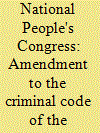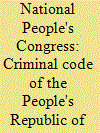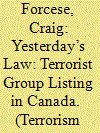| Srl | Item |
| 1 |
ID:
099966


|
|
|
| 2 |
ID:
099964


|
|
|
| 3 |
ID:
090828


|
|
|
|
|
| Publication |
2009.
|
| Summary/Abstract |
In his most practical work, the Laws, Plato combines a frank statement of the radical Socratic thesis that virtue is knowledge and vice involuntary with a prudential acceptance of the political community's need for retributive punishment. This paper examines the Laws' statements of principle regarding responsibility and punishment and compares these with the actual criminal code proposed in Book 9. The result is to show how a radical philosophic insight can be adapted to make ordinary citizens more gentle, thoughtful, and humane without sapping their moral commitments. Lessons are drawn from the Laws for the contemporary restorative justice movement.
|
|
|
|
|
|
|
|
|
|
|
|
|
|
|
|
| 4 |
ID:
159892


|
|
|
|
|
| Summary/Abstract |
Canada’s approach to proscription differs from that of other Westminster democracies. After the negative example of listing in the October Crisis, 1970 and with the subsequent advent of a constitutional bill of rights, Canada does not ban organizations; instead it penalizes certain forms of conduct, above mere membership, with terrorist groups. “Terrorist groups” include entities listed proactively by the executive, but also entities that meet a functional definition in Canadian criminal law. In practice, the latter, functionally-defined terrorist groups have figured in most terrorism prosecutions—only a few cases have involved listed groups. With the new focus on Daesh (a listed group), that may begin to change. However, executive listing raises unresolved constitutional doubts in Canada, prompting concerns that reliance on proscription may be more trouble than it is worth. Listing has also been used with respect to individuals, but such listings in Canada have already produced false positives, perhaps because of the due process deficits of listing by the executive. In many respects, therefore, terrorist group listing is yesterday’s law, problematic and of marginal utility. There may be reasons of administrative expediency to preserve listing, but the tool is more doubtful when used as a precursor to criminal prosecutions.
|
|
|
|
|
|
|
|
|
|
|
|
|
|
|
|